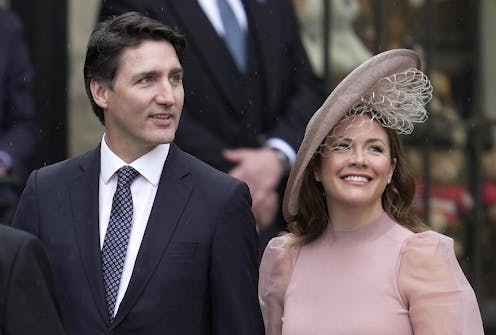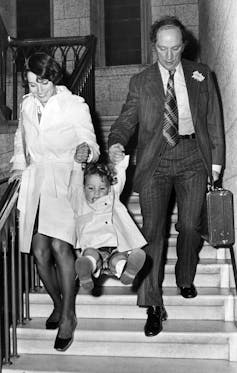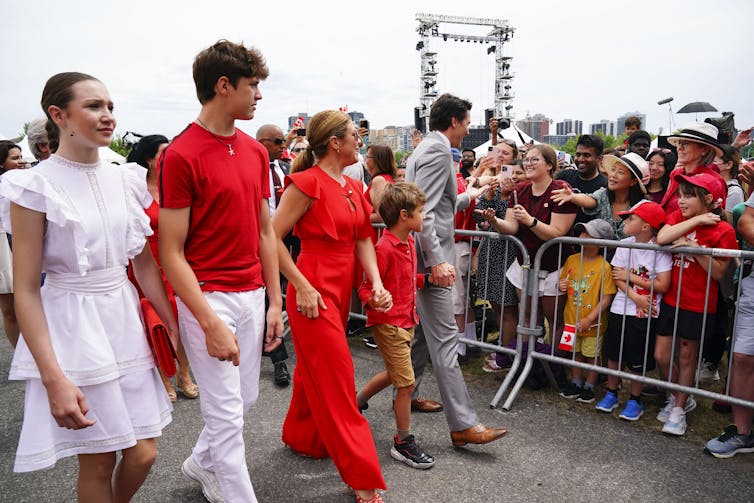
Prime Minister Justin Trudeau and his wife, Sophie Grégoire Trudeau, have announced they’re separating after 18 years of marriage. The surprise announcement has stunned Canadians who have watched the couple’s three children grow up in the public eye but also in a seemingly harmonious home environment.
“Sophie and I would like to share the fact that after many meaningful and difficult conversations, we have made the decision to separate,” Trudeau wrote in a message posted to his Instagram account.
With an event like this, thoughts inevitably move along two tracks — the personal and political. A separation is a difficult process for any family, and the humane among us wish for the best for everyone involved.
But breakups are especially difficult to go through for high-profile politicians, when every aspect must be stage-managed. The temptation to use the split for political purposes might be tempting to Trudeau’s political opponents, but any attacks risk sounding tone-deaf at best and cruel at worst.

Pierre Trudeau’s adage that the state has no place in the bedrooms of the nation remains as true today for politicians as for any other citizen — including for his eldest son and the country’s current prime minister.
Indeed, Pierre Trudeau’s marriage to Justin Trudeau’s mother, Margaret Trudeau, fell apart while he was serving as prime minister in his own high-profile breakup.
Lines blurring
There is a longstanding tradition in Canada, still more often observed than not, that the private family lives of politicians are not subject to political scrutiny and criticism in the way that they are in the United States — unless the personal becomes publicly scandalous.
Admittedly, the wall between public and private life has eroded somewhat during the Justin Trudeau era.
There are several reasons for this. First, the Trudeaus themselves have chosen to involve the family in political imagery at times.

At the same time, the increasingly polarized political culture in Canada has left fewer topics off limits to criticism — particularly online and on the political margins.
It is quite likely, and unfortunate, that there will be unsavoury attacks from those online fringes, including some operating independently of any factual content. That’s already apparent when reading the comments on both Trudeau’s and Grégoire Trudeau’s Instagram post on the breakup and cutting remarks on other social media platforms.
What impact the separation will have on Trudeau’s political career remains to be seen. It represents a challenge, but also an opportunity for both the prime minister and his wife.
If cracks in the public image of a conscious and mutual uncoupling begin to show, it will inevitably affect perceptions of Trudeau, given how much he has invested in developing the image of a devoted husband and father.
Empathy from most Canadians
At the same time, there is opportunity.
Many of us, myself included, have had our marriages end in separation or divorce and are co-parenting our children with our former spouses.
As a result, many of us likely have a great deal of empathy for what the Trudeaus are going through right now — which is why opposition politicians would be unwise to make any political hay out of the breakup. And while marital breakdowns are painful and difficult, they can lead to better things for everyone involved.
After nearly 10 years in office, some Canadians have tired of the very carefully cultivated public persona that Trudeau presents. It’s possible that the Trudeaus are just as tired of it.
If they emerge from this moment better able to live authentic lives, it may prove the beginning of a new chapter both publicly and personally, rather than the end of the story.
Stewart Prest does not work for, consult, own shares in or receive funding from any company or organisation that would benefit from this article, and has disclosed no relevant affiliations beyond their academic appointment.
This article was originally published on The Conversation. Read the original article.







